 HOME
HOME

MUSLIM MATRIMONIALS
(Marriage Ads)
Why Emirati Weddings are Getting Less Lavish
By Meriel Beattie
Reprinted from BBC Online, published Thursday, 16 December, 1999
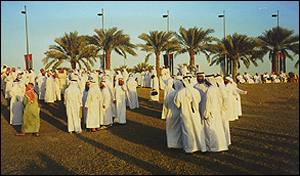 Some of the 650 grooms gather for December's mass wedding in the United Arab Emirates |
By normal standards in the United Arab Emirates, Mohammed Said's wedding was a modest affair. With crowds of sword-waving Bedouins; a huge feast -- and none other than the UAE President himself as guest of honour, Mohammed and 650 other bridegrooms celebrated their nuptials together on a huge floodlit parade ground in Abu Dhabi.
Lavish as such a display might seem to outsiders, to Emiratis it's a symbol of a new spirit of economy.
|
The mass wedding was organised -- and paid for -- by the government's State Marriage Fund: an organisation which is trying to persuade Emiratis to think more carefully about who they marry - and how much they spend on it. Usually Emirati weddings are private but opulent affairs, with as many as 1,000 guests, expensive light shows and fabulous, fairytale outfits for the bride. |
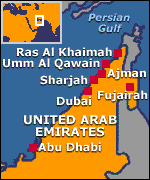 |
The bill for all this, which falls to the bridegroom to pay, can come to tens of thousands of pounds -- often forcing the young couple to begin their married life in debt.
"If I got married by myself I'd have needed 200,000 Dirhams (£33,000)" Mohammed says, as he shows his official quota of just 10 guests around the mass wedding party. "But with this kind of wedding here I just spend around 70,000 -- which the government has given to me."
High spending has been a way of life in the United Arab Emirates ever since the federation of seven desert states struck it rich with oil in the 1970s.
|
Now, the glittering skyscrapers, tinted glass limousines and designer boutiques of Dubai and Abu Dhabi are testament to the high-maintenance lifestyle that today's Emiratis enjoy. But things are not quite what they were at the height of the boom. Oil prices have fallen -- and right across the Gulf region people are having to think about diversifying and cutting back on some of the more extravagant aspects of their lifestyles. For Emiratis, though, flaunting your wealth is a hard habit to break. |
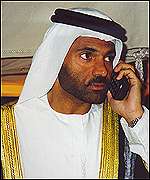 Mass weddings are helping the Emirates to limit conspicuous consumption |
"The overspending is comes from the household sector, " says economist Abdullah Sharafi. "It's 'Keeping up with the Joneses'. I look at my neighbours, and because they have it, I want it. I don't know if people will come to their senses. Perhaps this has gone too far."
Although economic statistics are a closely guarded secret in the UAE, there are indications that the government realises it is time to assist its people with some basic housekeeping values.
|
There are two main reasons why weddings in particular have been targeted. Firstly there's the sheer expense. Just an average middle class wedding can cost more than £50,000. The money goes on the bride's wardrobe, her jewellery, a sum paid to her father; a huge women's-only reception for all her friends and relatives -- and a men-only one for him. Such is the importance of keeping up appearances in the UAE that many grooms will go into debt to pay for all this, rather than lose face before their bride's family. |
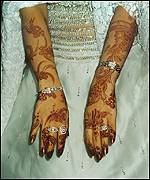 Traditional finery extends to jewellery and henna, not just a ruinously expensive dress |
Recently as many as 80 per cent of all personal loans being taken out by Emirati men were being used to cover wedding expenses.
But perhaps more worrying to the government than the expense is the fact that many Emirati men have been so daunted by the massive cost of marrying an Emirati girl -- that they've gone for the cheaper option of a less demanding foreign bride.
Among the local Emirati population, these mixed marriages are now seen as a worrying dilution of a group which is already a minority in their own country. Emirati nationals are outnumbered four to one by foreign workers -- and there's now a new drive to protect the identity and the culture of the local population.
Which is where the Marriage Fund comes in. Its main function is to give one-off gifts of £12,000 to help bridegrooms pay for their weddings. But there's a catch. The bride must be an Emirati girl, not a foreigner. Each groom must have a fertility check and an AIDS test. So far -- since 1992, the Fund has helped to marry off 44,000 couples.
Handing out thousands of state money for wedding parties may seem a rather bizarre way to preach economy -- but Fund officials say they're delighted with their success.
|
"People might think, hey -- why are they spending so much on these people?" says Marriage Fund President Jamal al-Bah. "But it does make sense: our Emirati men end up marrying foreigners because it's cheaper and Emirati women -- who are not allowed to marry out of their religion and culture -- are forced to become spinsters because there are no men left to marry them! "Our organisation cuts down on all these problems and helps to make people more modest with money. |
 Jamal al-Bah, head of the Marriage Fund |
Before our organisation existed, 64% of marriages were mixed; now we've helped cut it down to 26%".
There are signs, too, that the message about economising is slowly sinking in.
|
Upstairs at Arushi -- Dubai's most exclusive wedding gown couturiers -- French-born designer Mireille Loughlin is hard at work. Kneeling on the floor around her, skilled Indian craftsmen painstakingly hand-sew thousands of tiny beads and crystals onto the bodices of bespoke wedding dresses. Today's brides still want to be princess for a day, Mireille tells me -- but they're also becoming more conscious of value for money. |
 Mireille Loughlin of Arushi with one of her creations |
"Because these dresses are very expensive, the girls often rent them out after their own marriages - sometimes up to three times! This is happening more and more these days."
On the other side of the city, far removed from the dazzling white and glitter of Arushi's carpeted showrooms, a group of future Emirati brides sit drinking coffee in their traditional black ankle length gowns, or abayas. All students at the prestigious Dubai Women's College, the girls here are part of the new generation of Emirati women -- more pragmatic and more career-oriented than their mothers -- even though they still share the lurking fear of being left on the shelf.
|
"When my sister got married, it was very grand," Khadija, who's studying graphic design, tells us. "It was a traditional wedding and lasted three days. It was beautiful and made us very happy, but for me it was a waste of money. Today, when I ask her about it, she says 'I wish I'd saved the money to spend on my child and my house.'" Maryam, a media studies student, nods in agreement. "I have a cousin who got married 11 years ago and he is still paying off the debts!" |
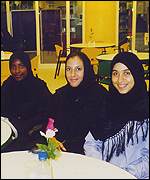 Pupils at Dubai Women's college: the younger generation is more careful with money |
Is marriage still important for you? I ask. "Yes," says Maryam, "But not in the near future. I'd like to work - and if I got married I would feel restrained. I feel I should develop myself before I take it on."
